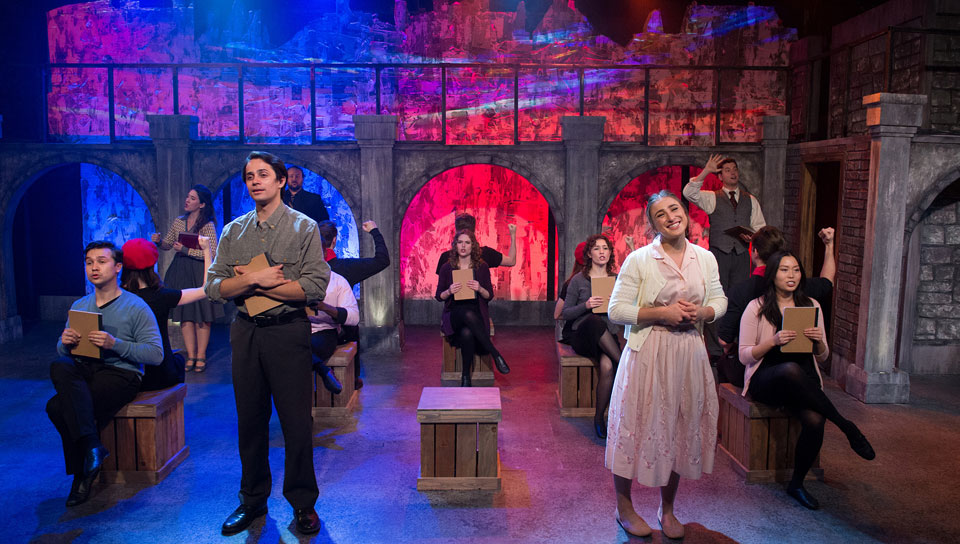
LOS ANGELES — “Lift it up, lift it up: we can sing our country free!” A cast of 20 all-singing, all-dancing performers and a five-piece band brought Singing Revolution: The Musical to the stage here for its world premiere on Sunday, January 30. It’s intended as “an inspirational new musical based on historical events” involving two pairs of star-crossed lovers set against the late 1980s more or less true story of Estonia’s song-filled, peaceful uprising aimed at separating from the USSR and reestablishing the country’s independence.
The work is presented by Dreamtone Productions in association with NewYorkRep, and features book and lyrics and a generically listenable Europop score by Tony Spinosa, who also directs. He sets the action, spanning four decades, in Tallinn, the capital city of the the Estonian Soviet Socialist Republic, the northernmost of the three Baltic countries (along with Latvia and Lithuania), situated right across the Gulf of Finland from Helsinki. At 17,505 square miles, Estonia is the size of Maryland and Connecticut combined, with presently 1.3 million people. It was the smallest SSR in the Soviet Union.
At intermission I had a chance to speak with Spinosa, who told me he had been on a Baltic cruise that made a stopover at Tallinn. The local guide on the city tour spoke about Estonia’s peaceful revolution, and as a veteran man of the theater, he immediately grasped the story’s potential for the musical stage.
“When I first learned about Estonia’s ‘Singing Revolution,’” Spinosa is quoted in publicity material for the show, “a light bulb went off in my head. People literally singing as a shield against Soviet attacks is a story I knew I needed to tell.” Clearly, his Estonian guide had related this inspiring tale from a particular nationalistic point of view brooking no uncomfortable perspectives that might complicate the narrative.
“Once word got out that I was working on this musical, TV shows began to approach me for interviews,” Spinosa continues. “I was introduced to the Estonian consul in New York City, who connected me with Estonia’s minister of culture in Tallinn. I was able to interview many of the leaders of the Singing Revolution, most of whom are still alive and still living in Estonia. With their help, I began to discover the passion and integrity of the Estonian culture and the heart of this musical’s story.”
Enter the EANC
The show has also received partial sponsorship by the Estonian American National Council. This financial and moral support turned a light bulb on in this critic’s head too. Wasn’t the EANC one of those many ethnic, national lobbying groups from the Eastern European Bloc that endorsed George H.W. Bush, former director of the CIA, in his 1988 presidential bid? And wasn’t he severely criticized at the time when it became apparent that so many of these groups were studded with fascist collaborators who fled the newly socialist lands to capitalist freedom in the U.S. (and were welcomed with open arms because they were such passionate anti-Communists) with plans to one day retake their homelands?
This alone hints at the Cold War agenda of Singing Revolution. But let the EANC speak for itself:
“The Estonian American National Council was established on July 19, 1952, in New York City by post-World War II refugees seeking to restore independence in Estonia, while making a new life in the United States. EANC was born from the need for a single national organization to unify and lead Estonians exiled in the U.S. Its founding aim was to coordinate efforts in fighting communism and liberating Estonia, along with the other nations trapped behind the Iron Curtain, and it has a 66-year history of advocacy in the U.S. throughout the changing landscape of Estonia’s occupation, its struggle for independence, and its evolution into a partner on the world stage.
“In 2021 Estonia celebrated its 30th anniversary of restored independence as a thriving nation and forward-looking member of the EU and NATO.”
Dear Reader, please forgive one further dive deeper into the EANC website, but it’s especially revealing of who is supporting the world premiere musical at this moment. The article “Opportunity for Baltic Americans to Support Ukrainian and Baltic Security” says:
“In the week leading up to the discussions taking place in Europe January 10-13 regarding Ukraine’s security and Western relations with Russia, Baltic Americans and the broader diaspora communities from central and eastern Europe have issued statements, letters, and calls to action to let U.S. policymakers know our concerns. The Estonian American National Council has been actively supporting and promoting these efforts.
“Estonian American voters still have the opportunity to participate in the American Latvian Association’s latest call to action to contact the White House and Members of Congress (MoCs). The initiative calls out Russian President Putin’s revanchist agenda to restore the Cold War ‘spheres of influence’ through its threats to Ukraine. It also encourages support for appropriations for robust security assistance for Ukraine and the Baltic countries, which has already been authorized in the Defense budget, and for existing legislation that protects European energy security.”
What do we take from history?
At the time the USSR was falling apart, U.S. officials promised that NATO had no aspirations to recruit the former Eastern Bloc nations, including those separated from the USSR proper, into its ranks. In those “peace dividend” fantasy years, it was a legitimate question to ask if NATO was even needed any more. But they lied. Bases, troops and weaponry, including missiles and nuclear arms, moved into place in all those countries. Russia—invaded by the French, by Kaiser Wilhelm and Hitler—has a long and costly history of defending its broad steppes against foreign intervention. Apparently the geniuses at NATO and in the U.S. State Department, under both GOP and Democratic administrations, have so little understanding of her geopolitical circumstances that they fear not to provoke the Russian Bear right up to her very borders. These new EU and NATO member nations of the Baltic region have obediently sent their soldiers to Afghanistan, Iraq and other hotspots of imperialist adventure.

In the musical, Sofia (Bella Hicks), a young Soviet Russian girl, daughter of Nikolai (Michael Scott Harris), the Russian military commander in Estonia, tries to interest the restive Estonians in embracing Soviet ideals of anti-imperialism, anti-revisionism and the principle that teaching others is a form of love. She tries to hand out copies of a red-bound pamphlet “We’re Here to Help: A Beginner’s Guide to Soviet Philosophy,” a title that inevitably recalls Ronald Reagan’s famous slur on the evils of government. So it would appear that the anti-imperialism part never appealed to the Estonians. And the teaching part—well, I’m not saying the Soviets weren’t kind of patronizingly ham-fisted (or worse) when it came to application of their lofty “national in form, socialist in content” thesis, but considering what they had just emerged out of.…
The history of the singing is largely true. But what is not true about the musical is not to allow any space for Estonians who genuinely did believe they were better off with the Soviets, especially having experienced what the Nazi occupation 1941-44 had brought them from the West. Any number of times throughout the musical the Soviets are called “occupiers,” period: It’s a totally black-and-white world, Soviet bad, Estonian good. No positive achievements under socialism are permitted to be mentioned.
Today the independent Baltic nations ban mention of German concentration camps in their countries for fear that inevitably such mention would have to include local collaborators—not only with the camps, of course, but with other actions of the Nazi administrations there. In some places anti-Semitism is openly voiced. And if these countries are so free now, why have they banned Communist parties?
All of which is not to say that Estonia, Latvia and Lithuania should never have achieved independence. They separated from Tsarist Russia in the nationalist wave that swept Europe post-World War I—not without some Soviet resistance, but relatively peaceably, and with Lenin’s correct understanding of nationalism as a historical force. In 1939, with the Ribbentrop-Molotov pact that divided Eastern Europe into German and Soviet protective zones, the three Baltics, all with powerful pro-fascist movements, fell back under the Soviet aegis. But not for long: By 1941 they were under Nazi control. The Soviet Union (and later Russia) never wanted to leave that buffer zone between Moscow and Berlin so unprotected ever again, especially after having lost 25 million of its own people in order to push the Nazis westward back to defeat. You don’t hear a word about that in the musical!
The banned Estonian flag is raised high amidst the gathering singing masses with their banned patriotic songs, “Never Forget Who You Are,” “That’s What I’m Fighting For,” etc., but the musical doesn’t disclose that toward the end, the Estonian CP itself split—one anti-independence faction stolidly pro-Moscow, the other eventually, in this era of glasnost and perestroika, coming around to defying Moscow. A middle way might have been found—a continued commitment to socialism and anti-imperialism as an independent country.
There’s a reason why Communists are so skeptical of nationalism as a first principle: Love for country is one thing, but what generally happens is the return of a ruling class composed of capitalists, bankers and speculators, militarists, the old Junker class in the countryside, and the general impoverishment of the people. Could it even be said that the Singing Revolution was in the end a Counter-Revolution?
And was it truly the peaceful Singing Revolution that brought Estonia to independence? Or was that only a unique local characteristic amidst the much larger picture of the USSR falling apart and devolving into 15 separate, independent countries—also without violence?
Deracinated commercialism
Okay, enough. What about the music—though it’s almost impossible to separate the propaganda from it. As much as the Estonians are urged to “stay true,” the musical, so far as I could tell, doesn’t reflect Estonian forms or modalities, not in any way comparable to the way traditional music was incorporated into Fiddler on the Roof, West Side Story, The Most Happy Fella, In the Heights, Zorba, etc. Nor does the musical emphasize Estonian dance or costume, perhaps a wedding scene marginally excepted. Other than ideologically—and even that’s debatable—it’s almost totally deracinated from any Estonian identity, though in a couple of verses the singers do render a few words in Estonian. The drive to score a Europop Broadway commercial hit (that “will appeal to anyone who loves K-Pop and the Eurovision Song Contest,” the promotion states), has resulted in a rousing, but inauthentic mass of platitudes about kindness—or “freedom, love, resilience,” as the musical’s tagline says. And for a work whose very title is about mass singing, the choral arrangements as music are unimpressive and unmemorable—and that’s one thing the Soviets did especially well, lifting up national cultures to a high artistic level.

Woven throughout the script are the ghosts of Lenin (Anthony Marciona) and Stalin (Adam Wylie) whispering into Gorbachev’s (Peter Van Norden) ear as he tries to “Make the Soviet Union Great Again!” (as though he and the toxic Donald have anything in common). These guys are the Three Stooges of Communism—not that there’s anything so sacrosanct against including them as dramatic characters, but in those precarious times, the pivotal role of Gorbachev needed to be more sensitively probed. (Incidentally, I think the Gorby and Lenin actors should have switched roles.)
Viktor Kuznetsov (Lucas Alifano), a Russian living in Tallinn who falls in love, in a subordinate story, with an Estonian school teacher Leena Rebane (Krista Feallock), is asked by the Commander where he’s from in Russia, and he answers “St. Petersburg(!)” No one would have said that! He would have proudly announced, “Leningrad.” Are the creators of this musical so nervous about truth they can’t even bear to say that?
The action centers on Estonian student Taavi Tamm (James Everts) and the aforementioned Sofia, though unanswered in the end is what became of the child they were expecting, who would have been born around 1969. The costume and makeup people don’t especially care about aging these characters over four decades, though in their defense the timeline is not wholly linear. He is one of the standout performers in the show, along with his love interest, who’s a physical mashup of Sarah Jessica Parker and Barbra Streisand. It’s a big cheesy show, with no fewer than 20 performers on stage. While the score is only attractive (and somewhat repetitive), the musicianship is thoroughly admirable.
The live band is led by Brent Crayon. The creative team includes scenic designer David Goldstein; costume designer Alex Jaeger; lighting designer Andrew Schmedake; sound designer Cricket S. Myers; projection designer Nicholas E. Santiago, and several others. Choreography is by Tracey Benson. James Bearhart is given primary credit for book and lyrics along with Tony Spinosa.
Performances take place through Feb. 20, Fri. and Sat. at 8 p.m. and Sun., at 3 p.m. at the Broadwater Theatre Main Stage, 6320 Santa Monica Blvd. (entrance around the corner), Los Angeles 90038. Proof of vaccination is required for admission. Masks must be worn throughout the performance. For tickets go to the box office website here.
An interview with Tony Spinosa can be heard here.












Comments